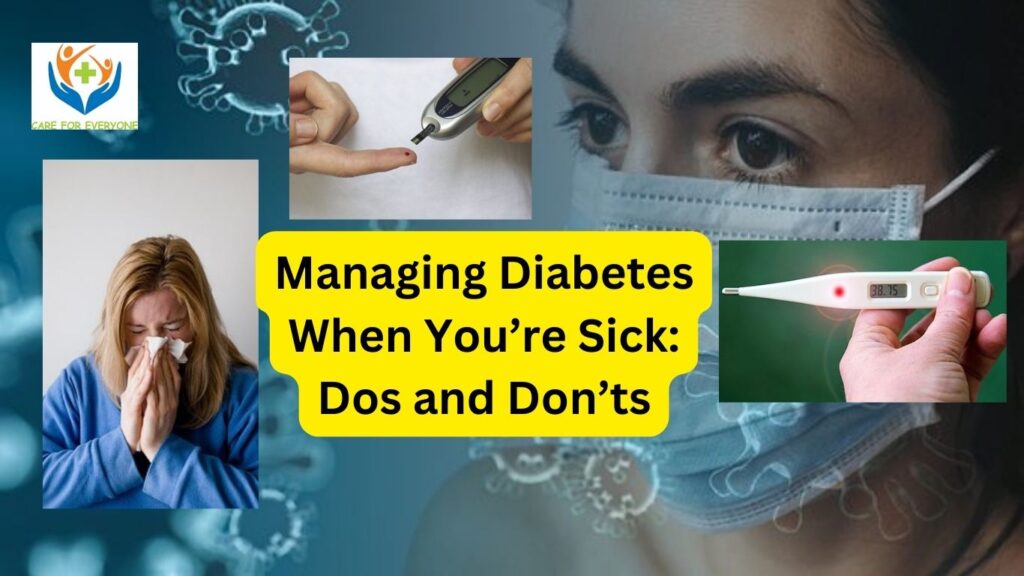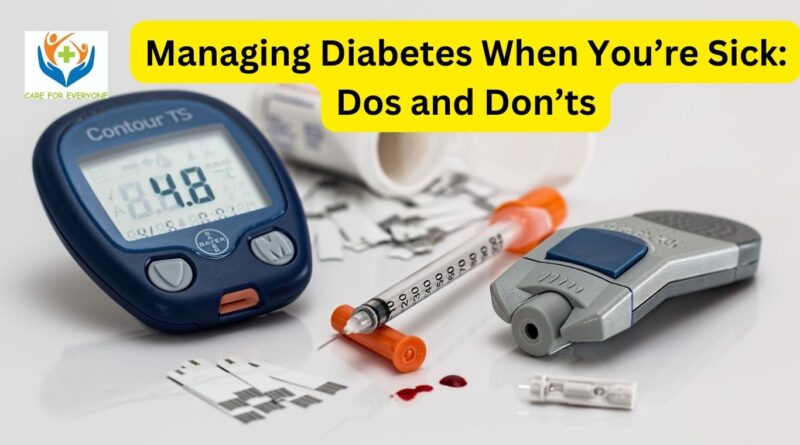Managing Diabetes When You’re Sick: Dos and Don’ts
Managing Type 2 Diabetes can be a daunting task, and if you are sick, it becomes even more challenging. Your body’s natural defence mechanism kicks in, releasing more glucose in the bloodstream, which can be a serious concern for diabetic patients. This article will provide you with a detailed guide on how to manage your sick days along with diabetes.
Introduction
When sick, your body feels stressed and releases more glucose, which can lead to severe health issues for diabetic patients. If you have Type 2 Diabetes, your body struggles to create insulin to control blood sugar. It is, therefore, vital to manage diabetes effectively while being sick.

Dos of Managing Diabetes When Sick
There are certain steps you can take to manage your diabetes effectively when you’re sick, ensuring your blood sugar levels do not spike, causing more trouble.
Monitoring blood sugar levels regularly
Monitoring your blood sugar levels is essential when you’re sick and have diabetes. Checking your blood sugar levels frequently can help detect changes and take necessary action to keep your blood sugar levels healthy. Your healthcare provider can recommend the frequency and timing of blood sugar tests based on your needs. Generally, you should test your blood sugar levels at least four times daily when sick, but your healthcare provider may recommend more frequent testing.
Staying hydrated
Staying hydrated is essential when you’re sick and have diabetes. Your body can lose fluids quickly when sick due to sweating, vomiting, or diarrhoea, leading to dehydration. Moreover, you’ll be urinating more due to higher blood sugar, leading to significant dehydration. When you’re dehydrated, your blood sugar levels can rise, making it harder to manage your diabetes. Drinking plenty of fluids, especially water, can help keep your blood sugar levels in check. You should aim to drink at least eight to ten glasses of water daily, and if you’re experiencing severe vomiting or diarrhoea, you may have to drink more fluids.
Continuing to take diabetes medications as prescribed
Taking your diabetes medications as prescribed is crucial when you’re sick. A lot of patients alter or avoid these medications when they are sick, which can lead to high or low blood sugar levels, a dangerous situation and sometimes even fatal. It’s essential to follow your doctor’s instructions, even if you’re not well. If you’re having trouble taking your medicines due to nausea or vomiting, talk to your doctor. They may adjust your medication or switch to a different one that’s easier to tolerate. But do not do it on your own.
Eating healthy and balanced meals
Eating healthy and balanced meals is essential when you’re sick and have diabetes. Your body needs proper nutrition to help fight the illness and recover. Eat regular meals that contain a balance of carbohydrates, proteins, and healthy fats. Avoid foods high in sugar or fat, as they can cause your blood sugar levels to rise. The better option is high-fibre foods like whole grains, fruits, and vegetables. Ensure you do not eat processed or packaged food high in sodium and unhealthy fats. They can be very dangerous for diabetic patients, especially when sick.
Don’ts of Managing Diabetes When Sick
it is essential to know what NOT to do when managing your diabetes while sick. Here are a few things you should avoid
Don’t stop taking your medications
It is crucial not to stop taking your diabetes medications, even if you feel you’re getting better. Stopping your medications can lead to a spike in blood sugar levels, which can lead to serious health issues.
Don’t skip meals
Skipping meals can lead to low blood sugar levels, which can make you feel weak and dizzy. Eat regular meals and snacks, and if you’re not feeling hungry, try eating smaller portions of food frequently throughout the day.
Skipping meals is a big NO when you have diabetes and are sick. It can lead to low blood sugar levels, causing hypoglycemia. Skipping meals can also make it hard for your body to fight off the infection, making your illness worse. So, make sure you eat your regular meals and snacks as prescribed by your healthcare provider.
Ignoring high blood sugar levels
Ignoring high blood sugar levels is never a good idea, especially when you’re sick. If you have high blood sugar levels for an extended period, it can lead to severe complications. These complications include diabetic ketoacidosis, which is a life-threatening condition. So, make sure you check your blood sugar levels regularly and take the necessary steps to keep them in check.
Exercising excessively
Exercising excessively when you’re sick can be dangerous, especially if you have diabetes. When you’re sick, your body is already under stress. Exercising can increase this stress, leading to high blood sugar levels. Moreover, it can also make you feel more tired and weak, making it harder for you to recover. So, make sure you rest and avoid any strenuous physical activity until you feel better.
Taking over-the-counter medications without consulting your doctor
Taking over-the-counter medications without consulting your doctor can be dangerous when you have diabetes. These medications can interfere with your diabetes medications, leading to high or low blood sugar levels. Moreover, some medications can also interact with other medications you’re taking, leading to severe complications. So, make sure you consult your doctor before taking any over-the-counter medications.
Conclusion
Managing diabetes when you’re sick can be challenging, but it’s not impossible. By following the dos and don’ts mentioned above, you can effectively manage your diabetes and recover from your illness. Remember to monitor your blood sugar levels regularly, stay hydrated, continue taking your medications, and eat healthy and balanced meals. Avoid skipping meals, ignoring high blood sugar levels, exercising excessively, and taking over-the-counter medications without consulting your doctor.
FAQs
Can being sick cause diabetes?
No, being sick cannot cause diabetes. However, if you have diabetes, being sick can make it challenging to manage your blood sugar levels
How often should I check my blood sugar levels when sick?
Your healthcare provider can recommend the frequency and timing of blood sugar tests based on your needs. Generally, you should test your blood sugar levels at least four times daily when sick. But, depending on your situation, your healthcare provider may recommend more frequent testing.
Can dehydration affect blood sugar levels?
Yes, dehydration can affect blood sugar levels. When you’re dehydrated, your blood sugar levels can rise. So make sure you’re drinking plenty of fluids to stay hydrated.
Should I continue to take my diabetes medications when sick?
Yes, you should continue to take your diabetes medications as prescribed by your doctor, even when you’re sick.
Can exercising excessively cause low blood sugar levels?
Yes, exercising excessively can cause low blood sugar levels, especially when you have diabetes.



